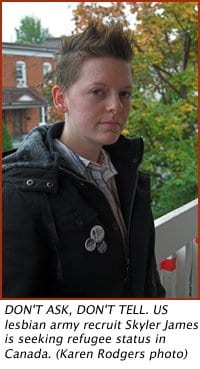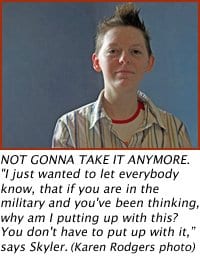“Lesbian war resister arrived in Cornwall. Assistance needed.”
That was the text of a cryptic e-mail I received in September from a member of the War Resisters Support Campaign — an Ottawa group that offers support to people deserting the US military in protest against the war in Iraq. It took a few days to get the full story, and when I first spoke to 19-year-old Bethany “Skyler” James, she sounded a bit overwhelmed.
Skyler and her friend Jeremy Daniel (also a soldier) had just driven for over 40 hours without a break, from the Fort Campbell military base in Louisville, Kentucky, to Cornwall, Ontario, where they finally ran out of gas and money.
“It started on a Friday and I’d just come back from the barracks and Jeremy came up to me and said, ‘Hey, did you still want to go up North with me?’ I said sure, so we looked up a lot of information about the War Resisters’ campaign … and we just packed everything into his truck,” says Skyler. “We stopped at a gas station somewhere in Kentucky and filled up his truck, and then an hour after we’d left base, I got a call from my friend saying that cops everywhere would be looking for us. I felt like a criminal, like I’d done something wrong.”
Skyler, like the 36 war resisters known to be now residing in Canada, chose to desert the US Army after hearing horror stories from fellow soldiers who had recently returned from Iraq and Afghanistan.
“People would sit around and tell stories about what they did, and someone else would say, ‘Oh, that’s not as bad as what I did.’ They were talking about how they would injure or kill people in Iraq,” she said.
Skyler’s own regiment was set to deploy to Afghanistan in a matter of weeks, and she decided that she did not want to be in a position to commit similar acts of violence.
Don’t ask, don’t tell
But unlike some of the other US war resisters, Skyler had another factor motivating her decision to come to Canada: she is an out lesbian, which directly contradicts the military’s infamous “don’t ask, don’t tell” policy. And Skyler, with her close-cropped hair and penchant for slim-fitting shirts and skinny ties, refused to hide her sexual orientation. In fact she flaunted it — even hanging a rainbow flag in her room at the military base, despite a rule which prohibits anyone who “demonstrate(s) a propensity or intent to engage in homosexual acts” from serving in the US Army.
“I didn’t want to hide,” says Skyler, who knew she was gay when she signed up for the military, but said she figured she could keep it under the radar. “In the end it didn’t work out that way. I was ridiculed daily by the other soldiers and even received hate letters.”
You would think that by disclosing her identity, Skyler would have received a “get out of the army free” card. By outing herself, she was clearing contravening regulations in a way that should have earned her a discharge. But according to Skyler, it isn’t that easy. The US military is so desperate to enlist more troops to fight in Iraq and Afghanistan, that they are willing to turn a blind eye to even the most blatant homosexual conduct — leaving people like Skyler to endure the double injustice of fighting in wars they don’t agree with, while also being subjected to harassment and intimidation from their fellow soldiers.
A poverty draft
Still, Skyler is preparing herself for the harsh criticism that the war resisters have faced in Canada. Because unlike the soldiers who escaped the Vietnam War during the 1960s, Skyler signed up for military service voluntarily. But anti-war activists argue that in a country where more than 40 million people have no health care whatsoever, the US military’s aggressive recruiting drive constitutes a “poverty draft” — where people from low-income communities feel they have no other means to support themselves and their families.
Skyler had been working at a call centre after obtaining her high school diploma, and said she felt she had few other career prospects. Her grandfather had been in the army, and she said her parents were “pushing her” toward joining the military. When she walked into a recruiting office a year ago, the recruiter assigned to her told her that she would “never be anywhere near combat,” which turned out to be patently untrue.
Community support
Since arriving in Canada, the Ottawa branch of the War Resisters’ Campaign has jumped in to help Skyler. Activists helped her file a refugee claim, and will be offering her legal support as she fights to stay in Canada.
Still, Skyler’s case might be on even shakier ground than some of the other war resisters now residing in Canada. Jeremy Hinzman, one of the first US soldiers to flee the war in Iraq and settle in Canada, is waiting to see if the Supreme Court will grant him leave to appeal his refugee claim, which was rejected in March 2005 by the Immigration and Refugee Board. His argument is based on the fact that the Iraq war was declared to be “illegal” by the United Nations, and that he should therefore be able to claim refugee status.
The war in Afghanistan, though heavily criticized, hasn’t obtained a similar rebuke. So when Skyler’s case snakes its way through the system, she won’t be able to make a similar argument. Still, Joel Harden from the War Resisters’ Support Campaign is prepared to stand behind her.
“Fort Campbell, as I’ve understood, deploys units to any number of locations in Iraq and Afghanistan,” says Harden in a recent e-mail interview. “The specific deployment location in Skyler’s case isn’t an issue for our campaign. The fact is she’s said no to Bush’s bogus ‘war on terror,’ and her daily harassment from anti-gay bigots in the US Army. Our campaign supports her decision to say no for a variety of reasons, and start a new life here.”
For Harden, the connection between the queer community’s fight for our rights and the war resisters’ cause is crystal clear.
“No soldier, whether army volunteer or drafted conscript, should be compelled to endure daily harassment — for whatever reason — or commit human rights abuses against others. Soldiers are human beings like everyone else; they should be allowed to leave jobs where bigots rule the roost, and say no to orders they disagree with.”
“In fact, that was one of the major findings of the Nuremberg Principles in the wake of the Nazi horrors of the 1930s. The international community decreed there were principles that everyone, including ‘soldiers following orders,’ were morally and legally bound to observe,” he says.
Skyler, for her part, faces an uphill battle from now on. She’s already filed her refugee claim. The next step is to obtain a work permit. And she’ll be couch-surfing for at least a couple more months, until she gets her paperwork in order so she can earn an income. But in the meantime, she’s been volunteering with the war resisters’ campaign, and has been getting to know Ottawa’ queer community, which she describes as “flamboyant” compared to life on a military base.
Weeks after we first spoke, Skyler has perked up considerably. In a video she posted on YouTube she sends a message to other queer soldiers who might be considering a similar journey.
“I just wanted to let everybody know, that if you are in the military and you’ve been thinking, why am I putting up with this? You don’t have to put up with it. I just wanted to be happy. But so far, I have to admit, it does feel like I’m on the underground railroad.”



 Why you can trust Xtra
Why you can trust Xtra


